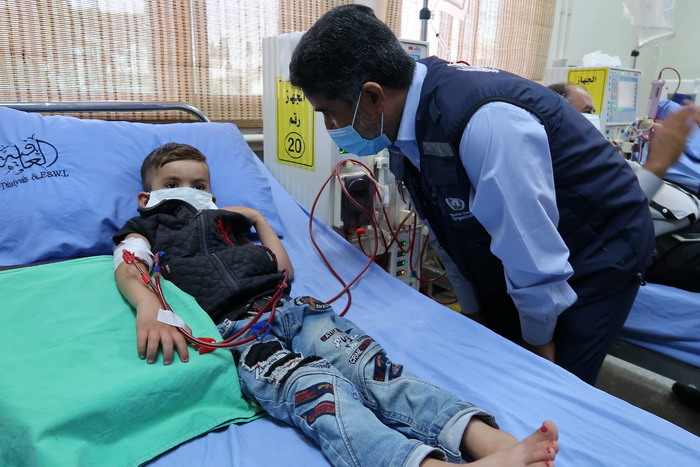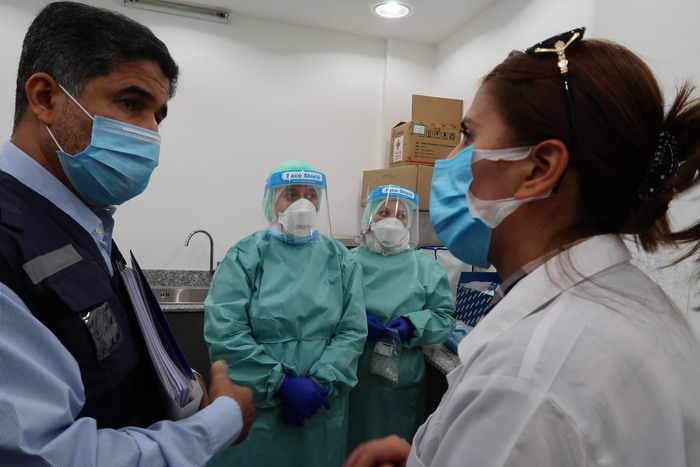 8 November 2020 – I recently returned from a 4-day mission to Syria, where I met with officials at all levels, health workers, partners, academia, and others to learn more about the overall health situation, find new ways of working together to strengthen service delivery, protect Syrians from current threats, and help strengthen the devastated health system.
8 November 2020 – I recently returned from a 4-day mission to Syria, where I met with officials at all levels, health workers, partners, academia, and others to learn more about the overall health situation, find new ways of working together to strengthen service delivery, protect Syrians from current threats, and help strengthen the devastated health system.
I met frontline health workers and patients in Damascus, Homs and Hama, including 6-year-old Jaafar, who depends on dialysis sessions 3 times a week at a WHO-supported NGO-run health care centre in Homs to stay alive and grow up. Doctors at the same centre told me of a single mother of 2 blind boys who had waited 2 years for a heart angioplasty, and was finally able to have this life-saving operation only last week.
At the Children’s Hospital in Damascus, I visited the new emergency department rehabilitated by WHO with support from Japan, which sees on average 300 children a day. There, I saw dedicated staff receive patients referred from throughout the country with burns, injuries and life-threatening infections.
Throughout my time in Syria, I met doctors, nurses, and other health staff who had braved years of working under threat of attack during the war, and yet stayed to save lives despite few resources. “We used to serve our people in normal times; imagine what we have faced, and what we are facing now,” one doctor told me.
At WHO, we talk about the resilience of health systems, and their importance in ensuring the health and well-being of all people, especially during crises. But in Syria, I saw the resilience and positive spirit of people who have not given up, and who – despite almost a decade of despair – are determined to restore their country to peace and prosperity.
But devastation due to war is still evident in Syria, and new complexities – such as COVID-19 – have added to the burdens of people already fatigued by the ongoing conflict, disease outbreaks, and natural disasters, including the recent wildfire that have destroyed livelihoods of many.
 Half of all health professionals are still outside the country, only 48% of public hospitals and 48% of primary health care centres are fully functional. Health workers, medical supplies, equipment and medicines are still in short supply. Almost one fifth of locally produced medicines are becoming unavailable due to the effect of the economic crisis on local pharmaceutical production.
Half of all health professionals are still outside the country, only 48% of public hospitals and 48% of primary health care centres are fully functional. Health workers, medical supplies, equipment and medicines are still in short supply. Almost one fifth of locally produced medicines are becoming unavailable due to the effect of the economic crisis on local pharmaceutical production.
People are suffering and dying due to lack of medicines for conditions such as hypertension, diabetes and kidney failure. Poor-quality equipment used over 2 shifts day and night is being stretched to the limit due to high demand and constraints in importing spare parts; sanctions have aggravated an already difficult situation, affecting all people and all sectors, especially the health sector.
Skilled doctors are desperate for resources that will allow them to perform life-saving surgeries and other medical procedures. Medical students are determined to serve their country yet are frustrated at the many gaps they will face as front-line providers.
Having survived war, hunger, and disease, the Syrian people now have another threat looming over them: like many countries around the world, we expect another wave of resurgence of COVID-19 cases in Syria.
As we continue to deliver supplies and expand testing capacity throughout the country through “all-modalities” approach, I saw high-level commitment across all levels of partners and all sectors for controlling the pandemic in line with WHO recommendations. However, testing capacity remains limited, adherence to mask use and physical distancing by the public remains low, and health workers remain at high risk due to lack of personal protective equipment.
The people of Syria have a long, hard road ahead. But despite the destruction and deprivation, there is enormous resilience and encouraging hope. We are with all Syrians every step of the way, especially the most vulnerable, in whatever circumstances they find themselves Despite all challenges, they have managed to maintain a basic level of health care that we can build on with support from the international community and our committed partners, within the country and beyond.








